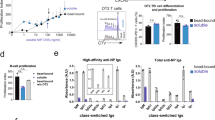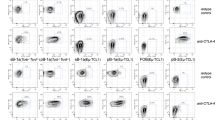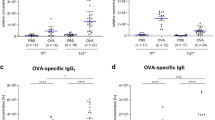Abstract
The mechanisms underlying T-lymphocyte tolerance induced in neonatal mice are still unknown1–3. It is unclear whether the tolerant state is the result of inactivation of T cells on exposure to antigen during development or of active suppression by other T cells specific for the same antigen. To distinguish between these two hypotheses, we have analysed the specificity of tolerance to three cytochrome peptides which differ by only a single amino-acid substitution in the epitope recognized by proliferative T cells. The peptides stimulate proliferative responses which are highly specific with minimal cross-reactivity. As antigen-induced clonal inactivation would address the same cells normally activated by that antigen, the specificity of tolerance should exactly match that of the proliferative response to the antigen, and each cytochrome peptide should induce tolerance to itself alone. Conversely, as T-suppressor (Ts) and T-proliferative (Tp) cells almost invariably seem to recognize distinct, non-overlapping determinants on protein antigens (see, for example, refs 4–6), suppressor-mediated tolerance should not be affected by substitutions in the proliferative T-cell epitope. Tolerance would depend solely on the existence of a shared suppressor determinant, so each cytochrome peptide should induce cross-tolerance to the others. We found that the specificity of tolerance matched that of the proliferative response: each peptide induced tolerance for itself but the response to the variants was unaltered. This result strongly supports the hypothesis of clonal inactivation as an important mechanism in induction of neonatal tolerance.
This is a preview of subscription content, access via your institution
Access options
Subscribe to this journal
Receive 51 print issues and online access
$199.00 per year
only $3.90 per issue
Buy this article
- Purchase on Springer Link
- Instant access to full article PDF
Prices may be subject to local taxes which are calculated during checkout
Similar content being viewed by others
References
Nossal, G. J. V. A. Rev. Immun., 1, 33–62 (1983).
Weigle, W. O. Adv. Immun. 30, 159–273 (1980).
Loblay, R. H., Fazekas de St Groth, B., Pritchard-Briscoe, H. & Basten, A. J. exp. Med. 157, 957–973 (1983).
Adorini, L., Harvey, M. A., Miller, A. & Sercarz, E. E. J. exp. Med. 150, 293–306 (1979).
Kryzch, U., Fowler, A. & Sercarz, E. E. in Protein Conformation as an Immunological Signal (eds Celada, F., Schumaker, N. & Sercarz, E. E.) 395–408 (Plenum, London, 1983).
Swanborg, R. H. J. Immun. 114, 191–194 (1975).
Thomas, D. W., Meltz, D. S. K. & Wilner, G. D. J. Immun. 123, 759–764 (1979).
Hansburg, D., Fairwell, T., Schwartz, R. H. & Appella, E. J. Immun. 131, 319–328 (1983).
Schwartz, R. H. A. Rev. Immun. 3, 237–261 (1985).
Araneo, B. A. & Kapp, J. A. J. Immun. 125, 118–128 (1980).
Yowell, R. L., Araneo, B. A., Miller, A. & Sercarz, E. E. Nature 279, 70–71 (1979).
Ikezawa, Z. et al. J. Immun. 131, 1646–1649 (1983).
Oki, A. N. & Sercarz, E. E. J. exp. Med. 161, 897–911 (1985).
Waters, R. H., Pilarski, L. M., Wegmann, T. G. & Diener, E. J. exp. Med. 149, 1134–1151 (1979).
Author information
Authors and Affiliations
Rights and permissions
About this article
Cite this article
Gammon, G., Dunn, K., Shastri, N. et al. Neonatal T-cell tolerance to minimal immunogenic peptides is caused by clonal inactivation. Nature 319, 413–415 (1986). https://doi.org/10.1038/319413a0
Received:
Accepted:
Published:
Issue Date:
DOI: https://doi.org/10.1038/319413a0
Comments
By submitting a comment you agree to abide by our Terms and Community Guidelines. If you find something abusive or that does not comply with our terms or guidelines please flag it as inappropriate.



